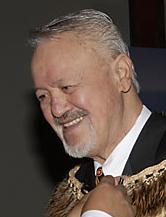Related Research Articles

Ngāti Whātua is a Māori iwi (tribe) of the lower Northland Peninsula of New Zealand's North Island. It comprises a confederation of four hapū (subtribes) interconnected both by ancestry and by association over time: Te Uri-o-Hau, Te Roroa, Te Taoū, and Ngāti Whātua-o-Ōrākei. The four hapū can act together or separately as independent tribes.

Mix was a greatest hits radio station in New Zealand, broadcasting music from the 70s, 80s and 90s. Mix was owned and operated by New Zealand Media and Entertainment. Mix is targeted at 35 to 54-year-olds. Its head office and studios were located in central Auckland, alongside New Zealand Media and Entertainment's seven other radio networks. In September 2020, Mix was replaced with Gold.

Joseph Parata Hohepa Hawke was a New Zealand politician and Māori land rights activist.

Takaparawhau / Bastion Point is a coastal piece of land in Ōrākei, Auckland, New Zealand, overlooking the Waitematā Harbour. The area is significant in New Zealand history as the site of protests in the late 1970s by Māori against forced land alienation by Pākehā. Takaparawhau is now the site of the private Ōrākei Marae, the public Michael Joseph Savage Memorial, and privately-owned reserve land that is accessible to the public.
Ngā Tamatoa was a Māori activist group that operated throughout the 1970s to promote Māori rights, fight racial discrimination, and confront injustices perpetrated by the New Zealand Government, particularly violations of the Treaty of Waitangi.

Dame Gaylene Mary Preston is a New Zealand filmmaker with a particular interest in documentary films.

Ngā Taonga Sound & Vision is an archive that was launched on 31 July 2014, following the completion of a three-year process whereby the New Zealand Film Archive "absorbed" the collections and operations of the RNZ Sound Archives Ngā Taonga Kōrero in 2012 and the Television New Zealand Archive in 2014.
The Māori protest movement is a broad indigenous rights movement in New Zealand. While there was a range of conflicts between Māori and European immigrants prior to the signing of the Treaty of Waitangi in 1840, the signing provided one reason for protesting. Disagreements in the decades following the signing sometimes included war.

The Ministry for Culture and Heritage is the department of the New Zealand Government responsible for supporting the arts, culture, built heritage, sport and recreation, and broadcasting sectors in New Zealand and advising government on such.
Merata Mita was a New Zealand filmmaker, producer, and writer, and a key figure in the growth of the Māori screen industry.
Deane Waretini is a musician from New Zealand. He had a #1 chart hit in 1981 with the song "The Bridge", a Māori language song set to Nini Rosso's tune "Il Silenzio". He is also the son of a historically significant Maori baritone singer and recording artist. In later years, Waretini was featured in a New Zealand television production that was built around him.

"Can't Get Enough" is a 1994 single from New Zealand funk rock band Supergroove. It peaked at number one in the New Zealand singles chart and later charted at 36 in Australia. The song was included on Supergroove's debut album Traction. Long-time TVNZ 2 continuity announcer Warren Thomas made a spoken cameo appearance part way into the song.
Tony McCarthy Recordings was a New Zealand record label owned by record producer Tony McCarthy. Some of the artists on the label were Deane Waretini and Mahia Blackmore. The label is also a representation of the only released recordings by singer Abe Phillips who was killed in an accident in 1971.

Gillian Mary Hanly is a New Zealand artist. She is best known for documenting protests and social movements in New Zealand's recent history.
The Television New Zealand Archive collection contains over 600,000 hours of television spanning almost 55 years of New Zealand's public television history. It includes New Zealand content such as documentaries, dramas, sports programmes and every TVNZ news broadcast from December 1986 to 2014. The archive only holds titles that have previously been broadcast – raw footage is not included. The archive also includes thousands of photographic stills. Both TVNZ and the Ministry for Culture and Heritage hold a list of the titles held in the TVNZ Archive collection. This has subsequently been released under the Official Information Act. The Ministry considers the majority of titles to be of high heritage and cultural value and the Minister of Broadcasting Craig Foss stated it was a "unique record of life in New Zealand". The contents of the collection are subject to the Public Records Act 2005. In 2014 the Ministry for Culture and Heritage, on behalf of the Crown, became the guardian of the archive. The physical collection is located in the Wellington region, in the former TVNZ Avalon facility now owned by the Department of Internal Affairs.
Patu! is a 1983 New Zealand documentary film directed by Merata Mita about the controversial 1981 Springbok tour. It follows the inner workings of the campaign against the tour, and captures scenes of violent conflict between police and protesters. It is a significant work of activist and indigenous filmmaking, and of New Zealand filmmaking in general.
Shirley Frances Whitley Maddock was a New Zealand producer, television presenter, author and actress. After early work in theatre and radio, she became a pioneering figure in early New Zealand television. She produced and presented a number of award-winning documentaries, including New Zealand's first ever locally produced television documentary series, Islands of the Gulf (1964). Later in her career she wrote a number of non-fiction books about New Zealand's history and landscapes, worked as a book reviewer, and continued to make appearances on television and radio throughout the 1970s and 1980s.
Kōhine Tewhakarua Pōnika was a New Zealand composer known for her Māori waiata (songs).
Wayleggo is a 1965 New Zealand short film. It was produced by the National Film Unit. The film was based on the 1947 musterer memoir Wayleggo written by Peter Newton.
The Shirt is a 2000 New Zealand film directed by John Laing.
References
- 1 2 "Bastion Point". British Film Institute. 1978. Retrieved 26 January 2023.
- ↑ "Bastion Point occupation leader Joe Hawke dies, aged 82". 1 News . 22 May 2022. Retrieved 30 May 2022.
- ↑ Tahana, Yvonne (24 May 2018). "Day of reflection for protestors and police on 40th anniversary of Bastion Point arrests". 1 News . Retrieved 7 March 2023.
- ↑ "Returning to Bastion Point". NZ On Screen . Ngā Taonga Sound & Vision. 25 May 2016. Retrieved 6 March 2023.